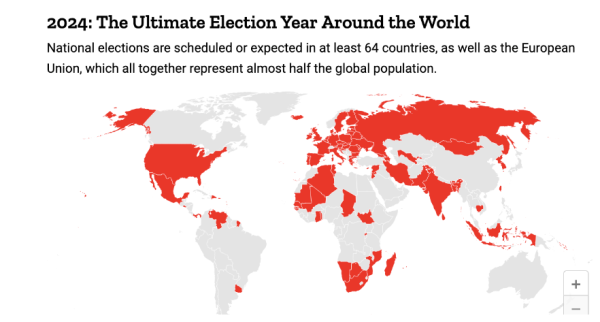Haiti Current Events
Bullwhips, cowboys on horseback, and people of color fleeing for their lives. It’s a scene from the Texas border this week that’s just all too familiar as an American, a cursed repetition throughout our country’s short history. In the past month, things have taken a turn for the worse in Haiti, more than they already seemed to be. Haitians are fleeing en masse to the Texas border, only to be turned away and subjected to harsh conditions. But can we really blame this on the Hatians themselves? Haiti’s history has been symbolic, with the Haitian Revolution being a beacon of hope for oppressed people around the globe, yet also tragic, riddled with the imperialistic tendencies often associated with European and American colonialism. The recent murder of President Jovenel Moise has only further spiked the emigration of Hatians to the United States. But are there other factors at play here? While some may argue that Haiti’s harsh and unpredictable climate is to blame, the United States and the other European countries responsible for bringing Haiti to its knees should be forced to pay reparations and provide aid to Haiti.
Haiti’s history has certainly been a key factor in its current path to self-destruction. Haiti’s origins as a slave colony are a tragic start to a long history of international racism. It was originally a cash-crop economy for the French, who leeched off of its profits and ran Haiti’s labor force into the ground planting only cash crops in massive quantities. Hundreds of thousands of slaves were imported from Western Africa to help with the production of sugar, coffee and timber, all lucrative cash crops for the French. Diseases brought over by France and other European countries also wreaked havoc on the Hatians, killing thousands. Over-cultivating, in addition to mass deforestation by the French, effectively ruined the soil of the area, dooming Haiti’s agricultural sector to be less proficient in the coming years. Eventually, under the leadership of Toussaint Louverture, the Haitians overthrew the French and subsequently became an inspiration for all oppressed people worldwide. But this victory was short-lived. Haiti was still heavily affected economically and politically by these European nations. When AP World History teacher Ms. Ryan was asked about the Haitian Revolution she stated: “The fact that their (the Hatians’) revolutionary figurehead, Toussaint L’ouverture, died in a French prison speaks volumes about the impact these European nations still had over Haiti.” In accordance with the racist, imperialist mindset that was so common at the time, European countries placed trade embargos on Haiti, dooming it to fail from the start as it could barely afford to prop up its fragile economy. This was especially true of America, as slave owners in the South feared that their own slaves would want to rebel after being inspired by Haiti. France also had its own bone to pick with the Hatians, as they had just been internationally humiliated by one of their smallest colonies. Haiti has not fared well economically over the years. More than half of their population lives below the poverty line, and many rely on subsistence farming to earn a living. France only recognized Haiti as an independent country in 1825, after forcing them to pay nearly $22 billion in reparations. Over a period of 120 years, 80% of Haiti’s revenue went into paying off that insurmountable debt. The 1915 U.S occupation of Haiti was another tumultuous factor which severely affected Haiti. In the five years prior to U.S intervention, seven of Haiti’s presidents were assassinated. When the U.S military arrived in Haiti, they reinforced racial segregation, as well as forced labor and press censorship. 15,000 Hatians died as a result of rebelling against the United States. Following the U.S withdrawal in 1934, Haiti faced its worst ever period of political instability and corruption. Today, Haiti remains in shambles, as natural disasters continue to wreak havoc to an already battered nation.
Haiti experiences more natural disasters than most Caribbean countries due to its location on a geological fault line in a region prone to heavy storms. Widespread deforestation has made Haiti particularly vulnerable to flooding and mudslides, which occur twice as frequently as in the Dominican Republic. Furthermore, a variety of characteristics, such as a lack of city planning, inferior infrastructure and housing, big coastal populations, and widespread reliance on subsistence farming, amplify the impact of disasters. In 2010, a major earthquake struck near the capital, killing 220,000 people and displacing 1.5 million more. The expense of basic reconstruction exceeded the country’s yearly GDP at $8 billion. Drought caused agricultural losses of nearly 70% between 2015 and 2017, while Hurricane Matthew destroyed the country’s houses, livestock, and infrastructure in 2016. In August 2021, Haiti was hit by two disasters in a row when a magnitude 7.2 earthquake slammed the southern peninsula, damaging 30% of local dwellings, killing over 2,000 people, and displacing tens of thousands more. Tropical Storm Grace worsened the devastation a few days later, dropping heavy rains and causing flash flooding and landslides. Epidemics and assistance mismanagement have only worsened the situation. Dengue fever and malaria are highly prevalent, and cholera, which was introduced by UN forces from Nepal following the 2010 earthquake, has killed 10,000 people and infected almost one million more. Meanwhile, critics claim that nongovernmental organizations have mismanaged billions of dollars in charity. While many may argue that Haiti’s current situation is mostly due to its tendency to be hit with natural disasters, the fact remains that recovery from these events is near impossible due to the economic and political instability Haiti is currently suffering from. Natural disasters are not the sole cause of Haiti’s current circumstance, but rather an unfortunate element which the country cannot afford to face. So while it remains true that Haiti’s physical devastation is largely due to natural disasters, the difference between them and other first-world countries facing similar natural destruction (for example, Hurricane Katrina in the United States) exists in the fact that the financial backing and recovery institutions are simply not present. The lack of these recovery systems is a factor that can certainly be traced to Haiti’s turbulent past.
Haiti’s historically tragic international standing has certainly played a role in the emigration of its people to the United States. Haiti is currently ranked 30th in the world for its murder rate, and it’s known to be a prevalent hub for human trafficking. It is clear that despite their glorious, star-studded revolution and path to independence, Haiti’s absolute mess of an economy and government can largely be attributed to the imperialist actions of the United States and other European countries. Therefore, it is only fair that these countries play a heavy role in rebuilding Haiti through their own form of reparations. These payments should come in the form of monetary funds or foreign resources to help Haiti bolster itself against its increasingly frequent natural disasters. While some of this aid is already provided by these nations, there is at this time no regulation or obligation to provide these services, and many of these resources are largely mismanaged. In addition, the United States has no reason to turn away Haitian immigrants at the border, as they played a large role in the push factors which resulted in this mass emigration. Haitians should be allowed to seek refuge in the United States without being hounded into herds like animals at the Texas-Mexico border. Hopefully, the Haitian people will be delivered the justice these “democratic” countries champion so proudly.










